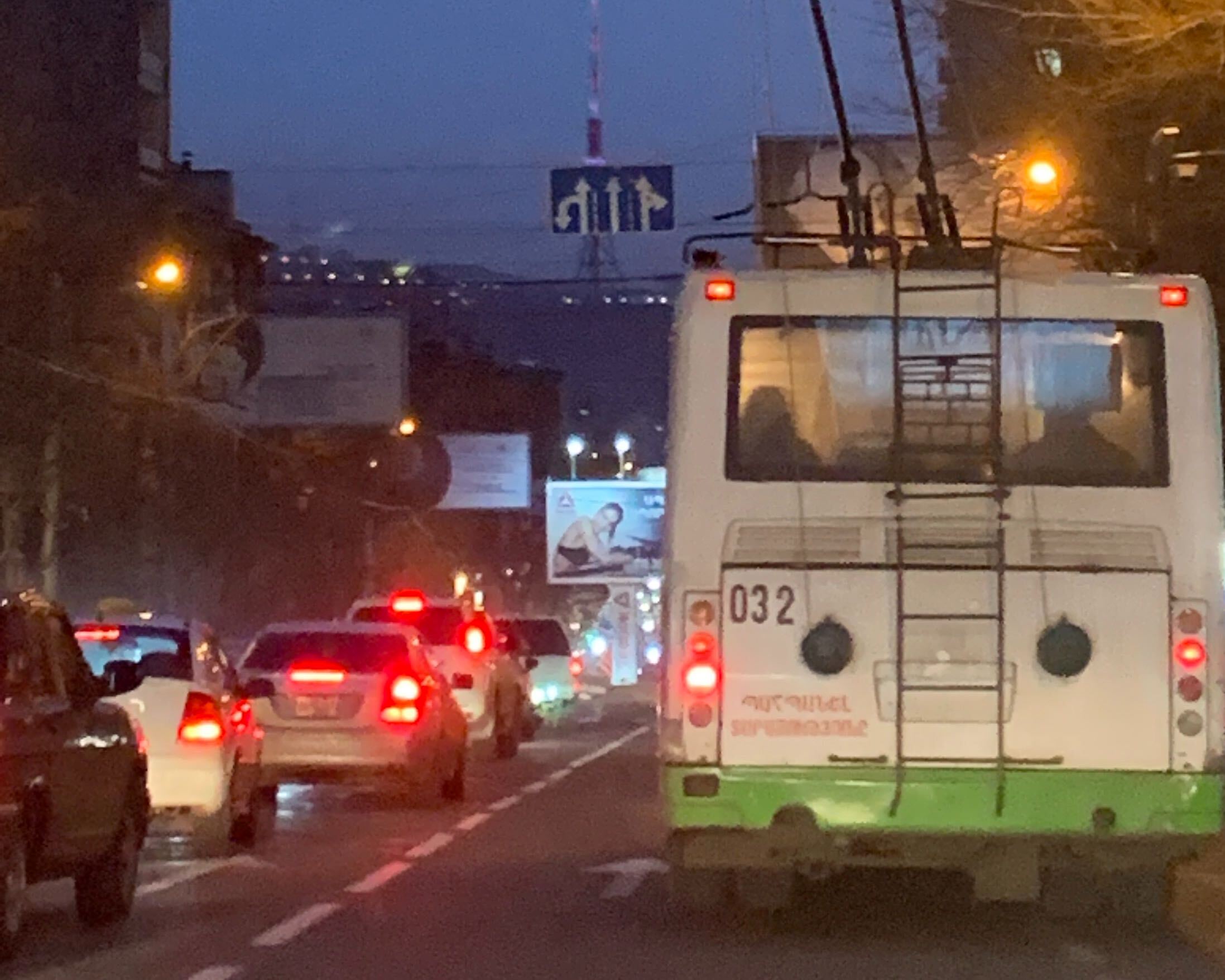
YEREVAN—Almost two years since the launch of promised mass transit reform, the Yerevan Public Transport Authority’s recently announced fleet tender has been met with disappointment in the capital. For disgruntled Yerevantsis, the order of 100 new minibuses falls quite short of a long-anticipated comprehensive mass transit overhaul which was scheduled for deployment by the end of this year. According to the plan unveiled by the municipality, Yerevan’s 42 routes were meant to be served by state-of-the-art, low-floor, full-sized buses equipped with GPS-enabled timetables and electronic ticketing systems. Announced timelines for the completion of new bus delivery along with the specified infrastructure changes have ranged from late 2020 to early 2022.
Mass transit reform was one of Yerevan mayor Hayk Marutyan’s key campaign promises back in 2018. He pledged to reverse a pattern of aborted attempts by predecessors to revive the city’s shattered and chronically underserved public transit system inherited from the collapsing Soviet Union. For many Yerevantsis, the aging, cramped and often unsafe minibuses known colloquially as marshrutkas remain the only viable transportation option. With extension plans for the metro system halted after the 1988 Spitak earthquake and the network of streetcar lines uprooted and rails sold for scrap, these privately-owned marshrutkas have been serving as a replacement as the backbone of the city’s mass transit network.
Public frustration over transit conditions combined with increasing car imports has led many commuters to choose driving, causing a spike in traffic congestion, air pollution and fatal accidents. Some individual mobility initiatives, like those launched by bike sharing companies YerevanRide and Mimo have seen modest success in encouraging cycling as an alternative. But even there, the municipality has done little more than pay lip service to a promise of incorporating safe bicycle lanes.
Critics have asserted that the failure of previous municipal administrations’ attempts to modernize the public transport system was the result of entrenched opposition from government-connected oligarchs who owned many of the lucrative lines. Former mayor Taron Markarian was directly implicated in this scandal when several lines were revealed to be registered at his home address. Still, Markaryan eventually signed an 850-thousand dollar contract with the British consulting firm WYG in 2016 to redesign the city’s mass transit along modern European lines. Among the expected upgrades at the time was an explicit promise to remove Russian-manufactured GAZelle minibuses entirely.
WYG’s proposal, delivered to the municipality in January 2018 accounted for 42 transit routes laid out to facilitate transfers, and served by 939 modern low-floor buses. The project, which was forecast to cost taxpayers $100 million, had not been implemented by the time Markaryan was pressured to resign in the wake of the 2018 Velvet Revolution. However, it wasn’t rejected outright by the incoming administration either. Upon taking office, Mayor Marutyan requested certain revisions to this original masterplan which would now require 845 buses and 101 trolleybuses, adding $50 million to the projected budget. The revision also accommodates a planned subway extension. According to the timetable laid out by the mayor on several occasions, this updated transport masterplan, approved in the summer of 2019, would see the replacement of some 450 minibuses by state-of-the-art full-sized buses by mid-2020.
However, questions remain as to when these expected replacement buses could realistically be available. The website of the European Bank for Reconstruction and Development (EBRD), which agreed to finance part of the $150 million price tag, shows a procurement tender by the Yerevan Municipality for 100 full-size city buses first published on April 28th of this year. Peculiarly, it appears to be closed as of July 13, with no application having been submitted. A procurement notice posted to the EBRD’s site in December of last year under Deputy Mayor Hrachya Sargsyan’s name outlines the purchase requirements for 18-meter, 12-meter and 8-meter long buses and trolleybuses, including the necessary public infrastructure upgrades with a listed budget of $140 million.
The Deputy Mayor defended the newly announced tender for small buses as a stopgap measure to replace the dangerously obsolescent fleet of GAZelle minibuses—many of which have seen more than 15 years of continuous use—thus meeting the goal of removing 450 of them from circulation by the end of 2020. While WYG’s revised mass transit plan does not incorporate any plans for minibuses, the Deputy Mayor insists that the narrow alleys of several of the city’s older slope-side neighborhoods such as Nork-Marash and Sari Tagh would not be accessible to low-floor, full-sized buses. He added that manufacturers of buses with smaller wheelbases, such as Mercedes’ Sprinter series, Ford’s Transit family and other European models would be welcome to apply.
However, municipal opposition leader and vocal critic of the mayor Davit Khazhakyan argues that the new tender’s technical specifications are practically tailored for Gorkovsky Avtomobilny Zavod (GAZ)’s latest generation GAZelles.
Sargsyan was unclear on why the original tender for full-sized buses didn’t result in a successful bid, nor did he provide any revised timelines for the transit masterplan’s completion. He did, however, promise that more details would be revealed about an upcoming tender for up to 300 mid-sized buses by the end of the week.


The article mentioned a subway. How far does Yerevan’s subway go?
The metro including the metro line is shown here.
https://en.wikipedia.org/wiki/Yerevan_Metro
It has been 2 weeks since this article was published!
Did Sargsyan provide “more details about an upcoming tender for up to 300 mid-sized buses by the end of the week” as you say he promised?